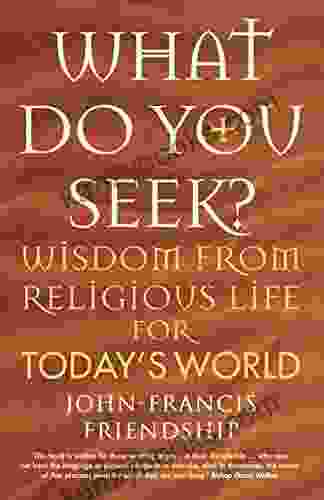Wisdom From Religious Life For Today's World: A Guide to Fulfillment and Success

In the midst of our fast-paced, ever-changing world, it's easy to feel lost and overwhelmed. We're constantly bombarded with information, obligations, and distractions that can leave us feeling disconnected from ourselves and our values. But what if there was a way to tap into a source of wisdom and guidance that has stood the test of time?
For centuries, religious traditions have offered profound insights into the human experience. From the teachings of ancient mystics to the wisdom of modern-day spiritual leaders, religious life has a wealth of knowledge to share about finding meaning, purpose, and fulfillment in our lives.
In this article, we'll explore some of the most valuable lessons that religious life can teach us about living in today's world. We'll cover topics such as:
4.7 out of 5
| Language | : | English |
| File size | : | 5343 KB |
| Text-to-Speech | : | Enabled |
| Screen Reader | : | Supported |
| Enhanced typesetting | : | Enabled |
| Word Wise | : | Enabled |
| Print length | : | 243 pages |
| Lending | : | Enabled |
- Finding inner peace and resilience
- Cultivating compassion and empathy
- Building strong relationships
- Living with purpose and meaning
- Achieving success on your own terms
Whether you're a lifelong spiritual seeker or simply curious about the wisdom that religious life has to offer, we invite you to join us on this journey of discovery.
One of the most important things that religious life can teach us is how to find inner peace and resilience. In a world that's constantly throwing challenges our way, it's essential to have the tools to cope with stress, adversity, and uncertainty.
Religious traditions offer a variety of practices and teachings that can help us cultivate inner peace. These include:
- Meditation: Meditation is a powerful tool for calming the mind and promoting relaxation. It can help us to let go of our worries and distractions and to connect with our inner selves.
- Prayer: Prayer is another way to connect with something greater than ourselves. It can help us to find comfort, guidance, and strength.
- Service to others: Helping others is one of the best ways to find fulfillment and purpose in our own lives. When we focus on the needs of others, we can forget about our own problems and find a sense of peace and contentment.
By incorporating these practices into our lives, we can develop the inner strength and resilience that we need to navigate the challenges of today's world.
In a world that's often divided by conflict and hatred, it's more important than ever to cultivate compassion and empathy. These qualities allow us to see the world through the eyes of others and to understand their experiences.
Religious traditions teach us that all beings are interconnected and that we should treat each other with respect and kindness. They encourage us to practice compassion, even towards those who are different from us.
There are many ways to cultivate compassion and empathy. Here are a few tips:
- Spend time with people from different backgrounds. When we interact with people from different cultures, religions, and perspectives, we can learn to appreciate the diversity of human experience.
- Listen to the stories of others. When we listen to the stories of others, we can learn about their struggles and triumphs. This can help us to develop a better understanding of the human condition.
- Volunteer your time to help others. One of the best ways to cultivate compassion is to volunteer your time to help others. When we help others, we not only make a difference in their lives, but we also learn to appreciate the value of human connection.
By cultivating compassion and empathy, we can create a more just and peaceful world.
Strong relationships are essential for our happiness and well-being. They provide us with love, support, and a sense of belonging.
Religious traditions place great importance on building strong relationships. They teach us that we should love our neighbors as ourselves and that we should forgive those who have wronged us.
There are many ways to build strong relationships. Here are a few tips:
- Communicate openly and honestly. Good communication is essential for any healthy relationship. When we communicate openly and honestly, we can build trust and understanding with others.
- Be there for your loved ones. When our loved ones need us, we should be there for them. This means being present both physically and emotionally.
- Forgive others. Holding on to anger and resentment can damage our relationships. It's important to learn to forgive others, even when they have wronged us.
By building strong relationships, we can create a supportive network of people who will be there for us through the ups and downs of life.
One of the most important questions we can ask ourselves is, "What is my purpose in life?" Religious traditions offer a variety of insights into this question.
Some religious traditions teach that we are all born with a unique purpose. Others teach that our purpose is to find our place in the world and to make a contribution to society. Still others teach that our purpose is to simply live a good life and to love others.
No matter what your beliefs, it's important to find a sense of purpose in your life. When you know what you're working towards, you're more likely to stay motivated and to make progress.
Here are a few tips for finding purpose in your life:
- Explore your interests and passions. What do you enjoy ng? What are you naturally good at? When you pursue your interests and passions, you're more likely to find a sense of purpose.
- Help others. One of the best ways to find purpose in your life is to help others. When you make a difference in the lives of others, you're not only making the world a better place, but you're also finding a sense of fulfillment and meaning.
- Live your values. What are your core values? What do you believe in? When you live your life according to your values, you're more likely to find a sense of purpose and fulfillment.
By finding purpose in your life, you can create a life that is both meaningful and fulfilling.
What does success mean to you? Is it having a lot of money? Achieving a high-powered career? Or is it something else entirely?
Religious traditions teach us that true success is not about achieving external goals. It's about living a life that is aligned with your values and purpose.
Here are a few tips for achieving success on your own terms:
- Define success for yourself. What does success mean to you? Don't let others dictate what success should look like for you.
- Set realistic goals. When you set realistic goals, you're more likely to achieve them. This will help you to stay motivated and to avoid feeling overwhelmed.
- Take action. The best way to achieve your goals is to take action. Don't just dream about success, take steps to make it a reality.
- Don't be afraid to fail. Failure is a part of life. It's how we learn and grow. Don't be afraid to take risks and to try new things.
By achieving success on your own terms, you can create a life that is both fulfilling and meaningful.
The wisdom of religious life has a lot to offer us in today's fast-paced, ever-changing world. It can teach us how to find inner peace and resilience, cultivate compassion and empathy, build strong relationships, live with purpose and meaning, and achieve success on our own terms.
By incorporating these lessons into our lives, we can create a life that is both fulfilling and meaningful.
If you're interested in learning more about the wisdom of religious life, there are many resources available online and in your local library. You can also visit a local religious center to learn more about the traditions and practices of different faiths.
No matter what your beliefs, we encourage you to explore the wisdom of religious life. It has the potential to transform your life for the better.
4.7 out of 5
| Language | : | English |
| File size | : | 5343 KB |
| Text-to-Speech | : | Enabled |
| Screen Reader | : | Supported |
| Enhanced typesetting | : | Enabled |
| Word Wise | : | Enabled |
| Print length | : | 243 pages |
| Lending | : | Enabled |
Do you want to contribute by writing guest posts on this blog?
Please contact us and send us a resume of previous articles that you have written.
 Book
Book Novel
Novel Page
Page Chapter
Chapter Text
Text Story
Story Genre
Genre Reader
Reader Library
Library Paperback
Paperback E-book
E-book Magazine
Magazine Newspaper
Newspaper Paragraph
Paragraph Sentence
Sentence Bookmark
Bookmark Shelf
Shelf Glossary
Glossary Bibliography
Bibliography Foreword
Foreword Preface
Preface Synopsis
Synopsis Annotation
Annotation Footnote
Footnote Manuscript
Manuscript Scroll
Scroll Codex
Codex Tome
Tome Bestseller
Bestseller Classics
Classics Library card
Library card Narrative
Narrative Biography
Biography Autobiography
Autobiography Memoir
Memoir Reference
Reference Encyclopedia
Encyclopedia Lynn Hall
Lynn Hall Barry Bryant
Barry Bryant Lily George
Lily George William Thomas Stead
William Thomas Stead Robert Redfern
Robert Redfern Neil T Anderson
Neil T Anderson Steven J Smith
Steven J Smith Tulku Thondup
Tulku Thondup Sharrona Pearl
Sharrona Pearl Sherwin Nicholson
Sherwin Nicholson Tia Kirk
Tia Kirk Tjitze De Jong
Tjitze De Jong Shannon Hale
Shannon Hale Sumit Gupta
Sumit Gupta Lindsay Lawless
Lindsay Lawless Sophie Stirling
Sophie Stirling Sarah Mclean
Sarah Mclean Jessica Wilson
Jessica Wilson Scott Onstott
Scott Onstott Steve Bremner
Steve Bremner
Light bulbAdvertise smarter! Our strategic ad space ensures maximum exposure. Reserve your spot today!

 Vladimir NabokovUnlock the Power of Nutrition: Discover 115 Amazing Recipes for Weight Loss...
Vladimir NabokovUnlock the Power of Nutrition: Discover 115 Amazing Recipes for Weight Loss... Trevor BellFollow ·16.4k
Trevor BellFollow ·16.4k Tom ClancyFollow ·2.2k
Tom ClancyFollow ·2.2k Neal WardFollow ·19.8k
Neal WardFollow ·19.8k Clinton ReedFollow ·4.8k
Clinton ReedFollow ·4.8k Roy BellFollow ·5.2k
Roy BellFollow ·5.2k Hank MitchellFollow ·4.5k
Hank MitchellFollow ·4.5k Craig BlairFollow ·8.7k
Craig BlairFollow ·8.7k Ralph TurnerFollow ·7.1k
Ralph TurnerFollow ·7.1k

 Virginia Woolf
Virginia WoolfGetting High Fat Diet Easily Using Keto Fat Bomb Cookbook
Unveiling the Power of Fat...

 Milan Kundera
Milan KunderaAre You Cryin' Brian? Find the Inspiration and Humor in...
Life can be full of...

 Edmund Hayes
Edmund HayesUnlock Your Vitality: The 15-Day Natural Energy Boost...
Are You Ready to...

 Gavin Mitchell
Gavin MitchellMultiple Sclerosis Life Expectancy: Unveiling the Impact...
Multiple Sclerosis (MS) is a...

 Gabriel Garcia Marquez
Gabriel Garcia MarquezGet The Thighs That Can Crack Man Head Like Walnut
Are you tired of weak, flabby...
4.7 out of 5
| Language | : | English |
| File size | : | 5343 KB |
| Text-to-Speech | : | Enabled |
| Screen Reader | : | Supported |
| Enhanced typesetting | : | Enabled |
| Word Wise | : | Enabled |
| Print length | : | 243 pages |
| Lending | : | Enabled |












